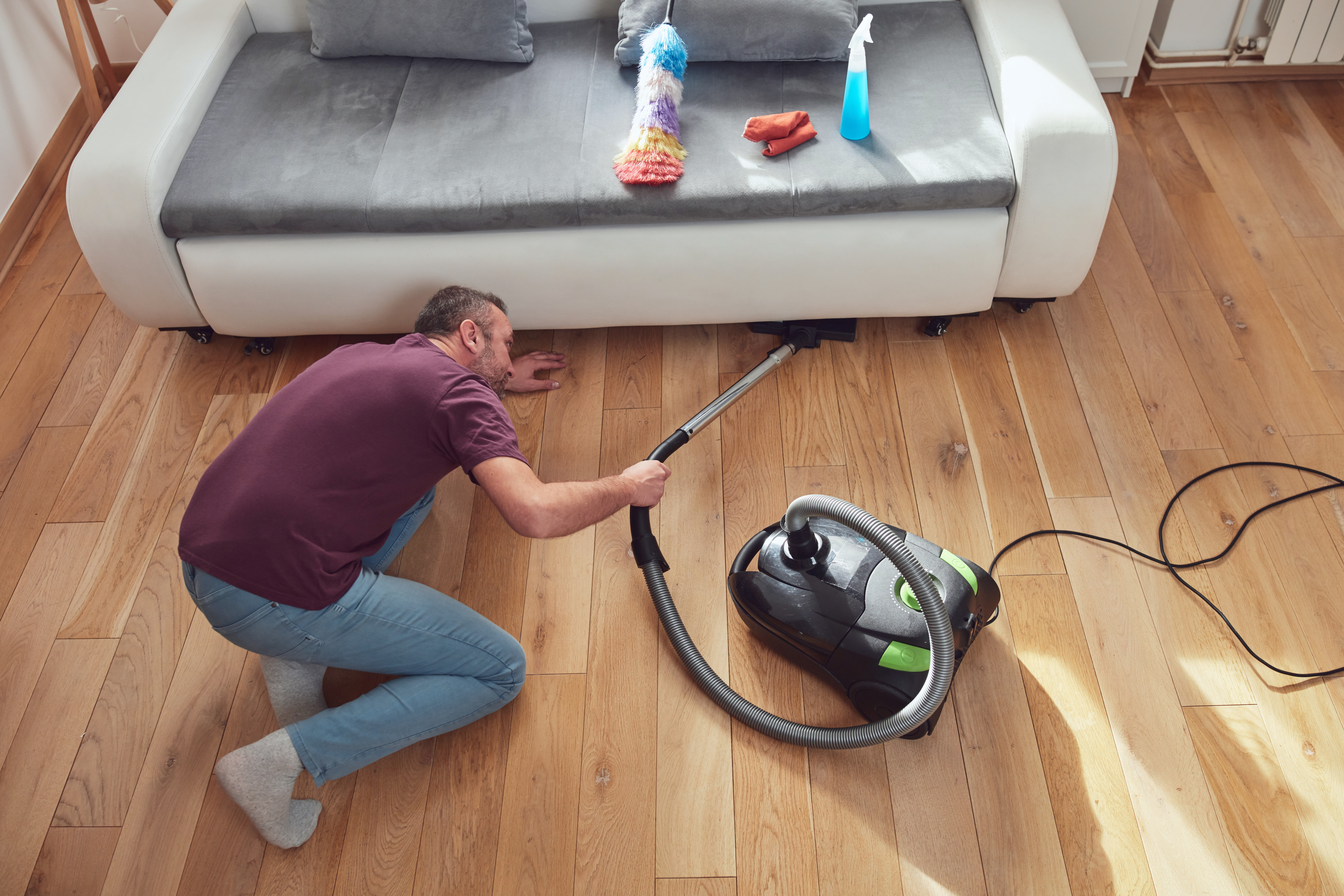
Discover upholstery cleaning cost estimates, including average prices, cost factors, and tips to help you budget for professional furniture cleaning.
Here's what you should know when hiring a professional upholstery cleaner
Over time, dirt, stains, spots, and general use make furniture look less than its best. While there are DIY tips to get out furniture upholstery stains, stubborn stains might call for hiring a professional upholstery cleaner. Follow the tips below to learn how to hire an upholstery cleaner so your furniture looks as good as new.

So, you’ve tried stain fixes on your sofa with no luck—now is the time to look for a pro. It takes time to find a professional upholstery cleaner you can rely on. You want to know the company's reputation and ask project-specific questions. Vetting the cleaners before deciding will ensure you make a confident decision.
Here’s what to do to find the right furniture cleaning company:
Review your warranty: If your furniture is still under warranty, cleaning it yourself might void it. Before you start any cleaning, read over your warranty information carefully. You can also consult with an upholstery cleaner about the warranty before work begins.
Check references: These days, it's effortless to do a quick online reputation check on trusted websites. Do some searching to see what customers have to say about different local businesses. Also, ask friends, family members, and neighbors if they’ve had any experiences with upholstery cleaners.
Compare quotes: Look at the timeline, warranty, contract, and customer satisfaction guarantees when comparing prices to find what fits your budget.
Before you look for an upholstery cleaning company, know three things:
What needs cleaning
How many furniture pieces need cleaning
Where the dirt and stains are
Giving a potential pro the nitty-gritty details upfront will mean you get an accurate quote.
Before you hire a nearby upholstery cleaning company, get at least three quotes and make sure to ask how they price their services. Professional upholstery cleaning costs around $150 to $200 on average.
Here's a breakdown of what you can expect the cleaning company to charge based on furniture type:
Loveseat: $60–$120
Sofa: $100–$300
Recliner: $60–$80
Armchair: $40–$80
Dining chair: $10–$30
Ottoman: $25–$50
Your pro might charge by the hour, by the project, or even per section in a piece. Some costs include time and materials along with equipment expenses.
Describe the piece that needs treatment, and inquire about the tools and chemicals they use. You don't want to get a $50 surprise charge for accessories or extra chemical solution expenses on your bill.
You can try to prevent and treat stains on your couches and dining chairs all you want on your own, but long-term damage is inevitable. Hiring a professional cleaner means you get a stain guru. You want to ensure that they are qualified and have references to verify their credentials.
To ensure you choose the upholstery cleaner correctly, look at how long they've been in operation before making a selection. Companies with years of expertise will identify what works best for stains and marks without harming the delicate fabric.
Finally, research the background and qualifications of any business you're considering. Is the company certified by the Institute of Inspection, Cleaning and Restoration Certification (IICRC)? Do they have positive reviews online?
In most cases, cleaners will offer you a ballpark quote over the phone. But to ensure the job gets done to your specifications, ask questions.
Here are some questions to ask your potential upholstery cleaner:
How many years of experience do you have?
What is your cleaning procedure?
Do you use chemical solutions? Are they safe for kids and pets?
How long will the project take?
How long will the furniture have to dry before I can use it?
Do you provide stain protection? And if so, at what cost?
Do you charge by labor, hour, or per piece?
Do you offer a discount for multiple items?
Do you have warranties or guarantees?
Do certain furniture upholstery fabrics require different cleaning methods?
Hiring your cleaner is the most stressful part of the project; you wouldn't want the pro to make a mistake on your most-loved furniture pieces. Before you start working with a cleaner, determine the following:
Make sure you have everything in order, like furniture pieces and cleaning specifications.
Before work begins, make sure you agree on the cost of the beginning, your budget plan, and any warranties.
Pay close attention to extras or add-ons so that you may keep accurate records before signing any agreements.
When you choose the cleaner, carefully review anything in writing, such as receipts or guarantees. Confirm the job specifications, the timing of cleaning, and arrange payments. Usually, you'll pay at the end. So, make sure nothing extra is on the bill before you sign on the dotted line.
Once everything is in writing and agreed upon, you will get a receipt for the job with the details. Track the job's progress to ensure everything is getting cleaned as promised within the time allotment.
Afterward, you might notice they missed something or didn't thoroughly clean a piece. Contact your cleaner and explain the problem so the company can resolve it.
When the pro finishes the cleaning, double-check the list to ensure the cleaner didn't miss a spot. Assuming you're happy with the job, finish up all the paperwork and pay for it. If things went well and you're pleased with the way your furniture turned out, you can offer a recommendation or leave a review.
Hiring an upholstery cleaner can cost between $120 and $230 or an average of $180. Some of the biggest cost factors are the type of furniture you want to clean, the material, and its overall condition. There are also a few other considerations, like the cleaning method you wish to use, your location, and the labor involved.
While it is possible to clean surface stains, hiring a professional upholstery cleaner may be worth it, depending on the piece of furniture and its condition. If your furniture is made from less expensive materials like cotton or wool, the odds you’ll damage it are much lower than silk or leather. Also, these pieces don’t need specialized cleaning tools or products, so you can get them looking brand new with your everyday cleaning supplies. A good rule here is if you don’t feel comfortable cleaning the specific material, or it’s a sentimental piece of furniture, it’s best to call the professionals to do the job right.
From average costs to expert advice, get all the answers you need to get your job done.

Discover upholstery cleaning cost estimates, including average prices, cost factors, and tips to help you budget for professional furniture cleaning.

Knowing how to steam clean a couch is one way to keep such an integral part of your home in great condition. Use this guide to help keep your couch good as new.

You might wonder if you can steam clean a leather couch. We share everything you need to know before you grab your steamer—it could ruin your furniture.

Learn when professional couch cleaning is worth it and when DIY will do it by understanding the pros and cons of both options, no matter the material.

Need to remove stains from your couch or just do a deep clean? Use this DIY guide on how to clean a couch to get it looking as good as new again.

Wondering how much it costs to rent an upholstery cleaner? Get prices, cost factors, and money-saving tips for your next DIY upholstery cleaning project.